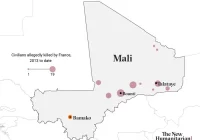French real estate attracts dirty money from all over the world. By matching government datasets available online, our cross-border team of journalists uncovered nearly €750 million of purchases with shady money, from Paris to the French Riviera. That is 196 suspicious real estate operations, carried out by 62 foreign individuals.
Among them was a woman who declared herself “without profession” but purchased over 52 euros million worth of exclusive real estate in Paris and St Tropez. Our investigation reveals that the woman is Sevil Aliyeva, the sister of the president of Azerbaijan – who succeeded his father in the role.
Other Politically Exposed Persons who bought millions of euros of real estate without legitimate sources of income included: the son and the wife of Paul Biya, the president of Cameroon since 1982; Faure Gnassingbé, the president of Togo; Khadem al-Qubaisi, a businessman at the center of the 1Malaysia Development Berhad scandal; Rafael Sarria Diaz, a Venezuelan citizen alleged to be a front for corrupt politicians; and Indonesia’s current defence minister, Prabowo Subianto.
In addition, our investigation found that Russian oligarchs have invested more than 350 million euros in luxury French real estate, nearly always without attracting any scrutiny.
Indeed, some sales involved French notaries with high-ranking positions in their profession’s accountability institutions. The team expects this story will likely lead to court cases and prosecutions over the next few years.
The story is available online in the Magazine L’Obs and was also published over 8 pages in the print edition.
How we did it
Our investigation was built on two publicly available government datasets. The first one, published by the French Ministry of Economy and Finance, lists all real estate properties owned by companies in France. It encompasses 16.1 million records. The second one, maintained by the French Institute for Intellectual Property, lists the shareholders and beneficial owners of the 11 million French companies. By combining those two datasets, we were able to find the names of people owning properties in France via a company, which added up to 2.48 millions names. We then matched these names with datasets like Open Sanctions to find the most interesting people.

